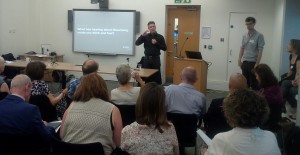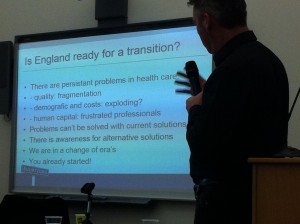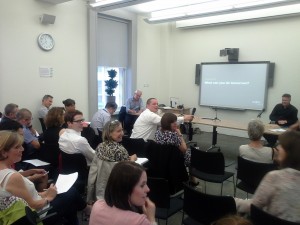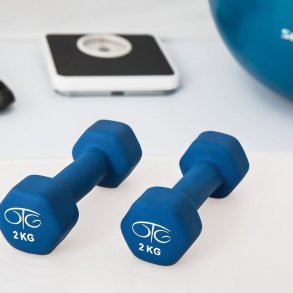
Jos de Blok – founder of the bureaucracy-free Dutch community nursing organization Buurtzorg, with 9,000 nurses but only 35 admin staff – recently visited the Royal College of Nursing (RCN). Jos shared how ‘next stage’ transformation in health and social care is already thriving, and beginning to spread across the globe. In the notes that follow, Anna Betz reports from an inspiring morning at the RCN headquarters.
On Thursday 16th July 2015 over 100 nurses, commissioners, health & social care managers, doctors and other interested parties came to the Royal College of Nursing (RCN) headquarters in central London to listen to Jos de Blok, the founder of Buurtzorg, a dutch nursing organisation. Buurtzorg made waves outside of the Netherlands since it was mentioned as one of the 12 case study examples of ‘Next Stage’ organisations used in Frederic Laloux’s book ‘Re-inventing Organisations’.
By the time it came to the Q & A session, the whole room was alive, buzzing with energy and genuine curiosity, wondering how this model could be adapted to the UK context
Jos was invited by the RCN in collaboration with Public World Consulting to share his experiences, successes and challenges in creating and developing a self-organising and self managing community nursing organisation. As professionals we came to listen, learn, challenge and be provoked around connecting to greater potentials in the realm of health and social care.
A packed room discusses challenges and experiences
The room was packed. Clearly more people turned up than had been expected. Something that had made this event so attractive was the fact that this wasn’t yet another lecture about someone’s theories and ideas but instead a very real experience from the field in which it was possible to ask real questions about very real personal, cultural and structural challenges.
Non-profit Buurtzorg has overhead costs of 8%, compared to an average of 25% – meaning ‘more money for the care and innovation’
So what is it about Buurtzorg that is so inspiring? From Jos’ Blog: “What started as a team of four nurses in 2006, has grown to nearly 8,000 nurses in 2014 and 9000 nurses today, with teams in the Netherlands, Sweden, Japan and now, the United States. A 2010 Ernst & Young report documented savings of roughly 40 percent to the Dutch health care system, and a 2012 KPMG case study found:

‘Essentially, the program empowers nurses (rather than nursing assistants or cleaners) to deliver all the care that patients need. And while this has meant higher costs per hour, the result has been fewer hours in total. Indeed, by changing the model of care, Buurtzorg has accomplished a 50 percent reduction in hours of care, improved quality of care and raised work satisfaction for their employees.’ “
Non-profit Buurtzorg has overhead costs of 8%, compared to an average of 25% – meaning “more money for the care and innovation”.
While Jos shared his nine years of experience and the valuable learnings along the way, the room was intently focused on his words. After all, starting out with four nurses, a budget of 20,000 Euros and no loans to now cover two-thirds of all the community nursing provided in the Netherlands is no small feat.
What happens now will be unstoppable. People feel disempowered by top-down hierarchies and much potential and innovation gets ignored or not even expressed
– Jos de Blok
What makes this even more pertinent to us in the UK is an awakening to the possibility of expanding on this work given that the Scottish authorities have committed to four similar projects – inspired by Buurtzorg – in 2015.
What can you do tomorrow?
During the pair exercises everyone really engaged and connected with each other. We were invited to share our experiences by listening and speaking in turn to questions such as:
- What has hearing about Buurtzorg made you think and feel?
- What can you do tomorrow?
By the time it came to the Q & A session, the whole room was alive, buzzing with energy and genuine curiosity, wondering how this model could be adapted to the UK context.
The RCN agreed to provide a room for monthly two-hour meetings for any professional interested in being part of a working group or Community of Practice
Being humble and realistic, Jos didn’t pretend that he had all the answers but emphasised some essential principles and agreements that should be in place in order to enable such a transformation from top-down hierarchies to self-managed small teams in various cultural, social and political contexts.
Howard Catton, Head of Policy and International Affairs at RCN summed the event up by saying: “A dynamo for change is palpable in the room. Hearts and minds are in the right place for things to happen.”
Jos concluded with the following inspiring words: “What happens now will be unstoppable. People feel disempowered by top-down hierarchies and much potential and innovation gets ignored or not even expressed. Treat every challenge as a challenge that can be overcome. In the end we all want freedom and autonomy as human beings to make this process possible.”
His advice was to build a social movement to connect what everyone is doing, to stay in touch and make sharing knowledge and experience central to this whilst supporting each other in our learning. This in turn could drip feed back to the dominant NHS culture.
To strengthen our shared sense that the system really does need to change and that it depends on us and our engagement with cultural change, Brendan Martin of Public World quoted a key clause from the Francis report (into the failings of the Mid Staffordshire Foundation NHS Trust), paragraph 1.118 which states: “To change the cultural degeneration ….. frontline staff must be empowered with responsibility and freedom to act ….”
Both Howard Catton from RCN and Brendan Martin from Public World agreed to work together to enable everyone to co-create a better future in health and social care in the UK. The RCN agreed to provide a room for monthly two-hour meetings for any professional interested in being part of a working group or Community of Practice. Dates and times to be announced.
A few pivotal points made by Jos in response to the many questions in the room:
- Start small and experiment with what works.
- Start by trusting people. Self-management is built on trust and taking responsibility as a team.
- Reducing management layers and changing governance systems will reduce overhead costs.
- Buurtzorg started with a budget of 20,000 Euros without a loan and paid salaries from the work they were commissioned to do.
- Buurtzorg integrated all complexity in the system and instead of dealing with 10 different products delivered by 10 different professionals, has a single assessment by a well-trained professional that covers everything and makes the assessment as simple as possible. This nurse also assumes responsibility to delegate specialist tasks if necessary i.e. serious mental health issues etc.
- To work with different cultures more effectively, employ nurses from the same ethnic background.
- Buurtzorg provides introductory and coaching sessions for nurses to help them align with the new model. Teams also meet once a week to discuss personal and work issues, share experiences and to find support.
- Buurtzorg received support from the Dutch Minister of Health to make regulations more supportive.
- It arranged many meetings with people from outside the system to explain the work and open up discussions.
- Engaging in dialogue with patients to find out how services are perceived from a patient perspective: How to reduce the problems for patients? How to combine services without damaging service for patients? Patients wanted to be able to call someone who can oversee the whole process of what needs to be done. Legislation may need to be changed to enable nurses to take on more responsibility.
- Buurtzorg has good quality IT. Every nurse has an iPad, everyone is part of an online community. Jos keeps in contact and makes himself available by writing regular blog posts where nurses can comment.
- Finances and salaries: make decisions about salaries based on tasks and required specialist training. Buurtzorg pays 22 Euros per hour, as the lowest, and 70 Euros per hour as the highest salary. To work out the average salary is important for financial sustainability of the organisation. There is a personal education budget for every nurse: every team can use 3% of their budget for education. If that is not enough, then they can ask for more. The team decides how to spend it.
- Never say no to someone who wants to further their education. Recently Buurtzorg started a programme on vitality for nurses, so that they can learn how to keep as healthy as possible i.e massages, mindfulness training etc. If it helps you to be better and happier at your work it is ok. In this way everyone feels responsible for the financial results.
- Ask every team that has an idea to start a project: now Buurtzorg has 100 live projects.
- Trust the younger generation and give your knowledge to them.
- Get the CEO of an organisation to call on everyone who wants to to work like this. Staff need to be enabled to be brave.
- Jos recently met with a minister in Scotland where four projects are being planned this year. Scots like to be the first to compete with the UK and set an example.
- Create a social movement and start to build a narrative through engagement
- Learn how to influence the influencers.
- People who want something need to be connected and work together seamlessly, which requires an online platform. For example in Japan 40 groups use a platform to share experiences. This is supported by the Japanese government.
- Purpose: Putting ideas into practice and connect with each other
- Guys and St.Thomas have already decided to test the Buurtzorg model.
- Southwark & Lambeth are ready to explore the new model.
- Buurtzorg made 9 Million Euros profit in 2014 and every nurse received a bonus

Audience questions
- Q. How is this way of working possible in large hospitals?
A: It is possible to organise small within large organisations, as self-organising teams in large hospitals for example.
The question to be asked is: What really has to be done in hospitals and what can be done in the community or small neighbourhood clinics?
Q: How to create a responsible and responsive workforce?
A: By trusting them and giving them responsibility to self-manage in small teams. No need for absence, performance and sickness management.
One important insight about the lack of trust in the system and its toxic consequences was shared by one of the managers present : “The NHS and Social Service don’t have relationship managers. Their managers’ jobs are to catch people out when they behave badly, not when they behave well.”
Another personal insight was that the transformation from the dominant model of NHS culture to a new model requires addressing the internal structures at both intra-personal and internal organisational structure levels in order to create a sustainable new model. As humans with a desire for safety and security, when we feel challenged we tend to fall back into our old habitual emotional, psychological and mental patterns of operating, even when these patterns no longer serve us well.
Dominant NHS culture:
- Deference to authority
- Top down hierarchy
- Risk-aversion
- Silos
- Poor communication between professionals and sectors
- Lack of coordination between professionals and department and waste of valuable resources. Duplication of work.
- Low innovation
- High turnover of staff due to climbing the hierarchical ladder
- Working in environments not conducive to the practice of compassion: high caseload, short appointments, lack of training in good listening skills, bureaucracy that means staff spend a lot of time in the office in front of computers ticking boxes to meet measurable performance targets.
- Payment by results doesn’t ensure person-centred care.
New model:
- Working autonomously
- Working in small teams
- Peer-to-peer culture
- Strong team spirit
- User-friendly ICT
- Enabling of innovation and experimentation
- Environments and spaces for shared reflection and collaboration
- Single assessments by a well-trained professional that covers everything and makes the assessment as simple as possible. This gives the patient one person to contact for everything and avoids confusion and duplication.
- Low turnover of staff
I’m wondering what innovations could be introduced in the NHS and/or Social Services, inspired by the Buurtzorg model, to reduce high staff turnover and burnout, produce a happier and engaged workforce and ensure continuity of care by having one point of contact?
What questions and ideas does this story evoke in you?
Links
Buurtzorg: Better Care for Lower Cost – presentation (King’s Fund)
Guardian Public Leaders Network article (12/2/15): ‘UK voters are being sold a lie. There is no need to cut public services‘, by Mark Thompson (Cambridge Judge Business School). Two extracts:
“The other day I read a cases study from Holland in Reinventing Organizations that made me fall off my seat. The Buurtzorg community nursing organisation has a back office of 30 people to support 7,000 frontline nurses. It has almost no middle management – no HR, legal, estates, comms, finance, IT, procurement and so on. An audit firm reported that 40% fewer hours of care are required by the organisation’s patients, and its nurses have 60% less absenteeism and a 33% lower turnover than other nursing organisations.”
“Now for the interesting numbers. The audit firm suggests that Holland could achieve savings of €2bn each year if all of its nursing organisations achieved similar results. Grossed up for the UK, that’s almost £6bn saved, every year. Just in community nursing.”
Twitter: Jos de Blok
Public World http://www.publicworld.co.uk/health-and-social-care/buurtzorg-nurse/
Annie Francis from Neighbourhood Midwives
Sharda Nandram, mentioned by Jos de Blok as one of his inspirations: http://www.praansol.com/ and http://www.praansol.com/wp-content/uploads/2010/10/Spirituality-Business-Press-Release1.pdf
Audrey Birt: Health and Socialcare Academy: Transformation of health and social care. “If not now when; if not us, who?”
RCN Policy and International Department Policy Briefing 02/15 March 2015 The Buurtzorg Nederland (home care provider) model
Anne Cooper, Lead Nurse for Informatics at NHS England: ‘Buurtzorg – what’s it all about?‘
Jos de Blok lecture at RSA (London) Humanity above Bureaucracy; 17th November 2014
Jos de Blok visits Age UK Lewisham and Southwark: Age UK L&S @AgeUKLS Jul 17
Learning about the #BuurtzorgModel @buurtzorg for Southwark &Lambeth
Featured





Andy Lippok, who organised a conference with Jos in Scotland, has just got in touch – from Holland where he’s meeting Jos & co planning details for the test of the Buurtzorg approach in Scotland in the autumn.
Here’s a link to the Buurtzorg event in Scotland on June 26th 2015: http://www.resolis.net/buurtzorg-conference.html
– complete with videos of Jos, presentation, videos of World Cafe discussions, harvested material etc.
Fabulous!
I’m sure may of us will be keen to hear how this progresses
Matthew Mezey
So heartening to hear about this. Can Jos explain more about the exact tasks of the nurses – do they do all the cleaning and meal-preparation for their patients? And the other changes to people’s work roles that have made the difference?
That’s a wise advice that points also to the path of how a movement can become a system of influence. Not only in health and social care, but in the domain of any social system that we need to reinvent for a better world.
We, at Enlivening Edge, consider a big part of our reason for being is to help people participating in any of these reinvention movements “stay in touch and supporting each other in their learning.” One way of demonstrating our solidarity is to create a new section of EE for each of the social systems, where it can support the work of ‘reinvention’ activists. If Anna’s article engages people’s mind and heart, and their curiosity of how specifically could they bring their energy to the momentum for self-management in this domain, then “health & social care” could be one of the first sectors to benefit from a new department of the newsletter dedicated to them.
Interesting I picked out the exact same statement
“build a social movement to connect what everyone is doing, to stay in touch and make sharing knowledge and experience central to this whilst supporting each other in our learning.”
I think the idea of a Section for each Social System is a great point (it occurred to me as well) the only apprehension that almost instantaneously formed, is would we not risk compartmentalization (or the Silo effect)? There is a lot of learning value to be had from other industry practices, due to differing exposures to challenges. As Jos stated in his concluding words which I also found poignant. “Treat every challenge as a challenge that can be overcome. In the end we all want freedom and autonomy as human beings to make this process possible.”
Wouldn’t it be wonderful if Social workers and health visitors did the same, making sure young families on their patch were thriving.
Wouldn’t it be wonderful if MH workers had the same degree of commitment to wellbeing and MH on their patches.
The possibilities are endless, you simply have to unpick the mindless complexity of some organisations.
I agree, Venetia Young – some Social Workers are just too corrupt to care, aren’t they??!
😉
Just wanted to let you know – if you haven’t noticed – that we have a new story about Buurtzorg recently published here: https://enliveningedge.org/news/uks-royal-college-of-nursing-reiterates-its-support-for-bureaucracy-free-buurtzorg-model/
Admittedly, it’s not major news – but interesting to see the ongoing support from the RCN.
We certainly plan to share more detailed news about about developments (pilots etc) in the UK – and around the globe – with Buurtzorg, over the coming months.
I find it fascinating how some thought-leaders are suggesting simplification as the answer, and for others it’s about keeping up with complexification (a far more common response, I think).
Buurtzorg falls into the former camp; one book about the organisation is titled: ‘Organizational Innovation by Integrating Simplification: Learning from Buurtzorg Nederland’.
Somewhere on the Libertarian end of the political spectrum, Charles Murray also argues against complexification – arguing that it marginalises many people, who get left behind in our world of knowledge-based professions.
Prof Robert Kegan – one of the foundational researchers referenced by Laloux to support the idea of a ‘Teal’ stage – argues that we need to complexify our minds in order to keep up with a reality that risks making us ‘in over our heads’.
I’ve literally never seen a discussion of the pros and cons of simplification vs complexification as the way to go, let alone one that brings together disparate voices (Kegan, Murray, Jos de Blok). I may blog about it at some point…
Interestingly I had a conversation recently with George in the context of understanding complex health conditions like dementia for which present day medical science cant find disease modifying treatments. I believe that medical science needs to drop the idea of eventually finding a cure by exclusively and simply focusing on the brain. Once it understands healing as restoring balance in a complex ecosystem, it will be able to look at the Whole as an interrelated network.
On the one hand it seems more complex but on the other hand it is actually much simpler as it enables a bigger picture perspective where all processes are naturally inter-connected by feedback loops and through that support life.
What is simple about it is that we need to start with trusting life. Our task is to provide enabling conditions. To me that is what Jos de Block has understood so beautifully. Buurtzorg’s great strength that enables such rapid growth is Trust. People feel attracted to it as they can learn to become themselves.
This one ingredient needs to be embodied. We can do away with unnecessary layers of complex bureaucracy when we trust ourselves and each other.
This was George’s response to my question about complexity:
“When people are complaining that something is too complex to comprehend they are saying that they don’t have the tools and means to see the relationships between the whole and the parts.
Complexity is a trick of evolution to seduce us into giving up the false sense of separate self and recognize the collective as the basic unit of solving problems .
We need to be seduced into dropping the false sense of separate self . So when we meet things that are too complex to deal with, we need to ask for help from the collective intelligence.”
Way to go.